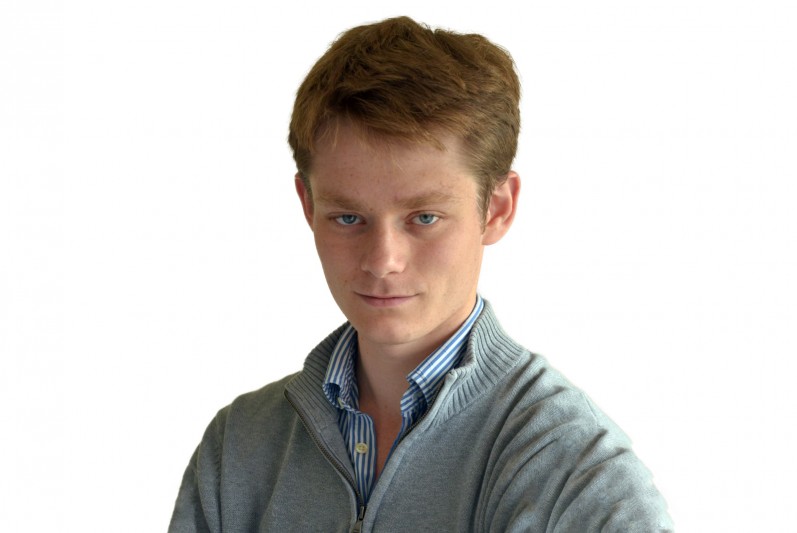"I’m really proud to be a BU graduate because the course - and the experience - has really shaped me. The university was a great place. Lecturers provided me with focus, guidance and encouragement."
Ed Lawrence hasn’t been out of university long, but it hasn’t stopped him from breaking some of the UK’s biggest news stories.
It all started while studying Television Production – not the most obvious choice for a freelance journalist, by Ed’s own admission – but a degree that gave him all the skills to work as a broadcast journalist.
Ed explains, “My career really started whilst I was studying at BU. During my second year of university, over the Christmas break, I had gone to Calais with some coursemates to investigate the situation for migrants and refugees. This was in 2013 before the refugee crisis or Calais was even much of a story. It caught the attention of a BBC reporter I met over coffee.
"A few months later, when the refugee situation became the ‘big’ story, that reporter hired me freelance as a producer to make films with him on migration. These were broadcast on BBC2 and the BBC News Channel as well as online. It was the dream opportunity. I was pitching ideas, self-shooting and making films. From there, I slowly but gradually started to do more freelance work for the BBC.”
Ed graduated from BU in 2015, with a book full of contacts, and soon began working freelance for large broadcast media outlets like the BBC and ITN; “I’ve covered many stories with ITV too, including stints producing in Calais covering refugees, and unaccompanied children. I actually gained access to the first unaccompanied children allowed into the UK and travelled with them on the Eurostar for ITV News."
Despite covering some hard-hitting stories in occasionally uncomfortable situations, Ed is never fazed.
“It’s actually quite normal for me to see my work, or even myself on TV. At first, I used to smile from ear to ear, but now it’s quite normal. It’s very satisfying, particularly if you’ve really put in the work, or if you’re telling a powerful story. Admittedly, I was insanely pleased when my doorstep interview with Michael Gove made it onto not only The Last Leg, but also 8 Out of 10 Cats. I wasn’t even aware until several friends called me to say that I had been on TV chasing Gove. That was quite funny.”
One story in particular brought Ed’s work centre stage, even appearing on BBC Radio 4’s flagship Today Programme..
“I reunited two long-lost refugee brothers from Afghanistan," Ed said. "I had met the youngest, aged 16 at the time, in Calais where he was trying to cross into Britain to find his estranged older brother who had made the journey seven years before. They had last seen each other in Afghanistan when a warlord had murdered their father.
"After weeks of digging, I was able to find the older brother and we took him to Calais. It was quite something to see. In the following months, the Home Office actually flew the younger brother to London to be with his brother.”
The work keeps coming too, and Ed is enjoying every moment of his young career, and the places it has taken him.
“I now cover a range of stories. Most recently I’ve spent the past few weeks at the Grenfell tower disaster and tracking down those charged over the Hillsborough disaster. I’ve already worked with several BU graduates. At the moment, I’ve been full-time freelance with ITV News, and I’ve also been approached by the BBC about covering foreign stories. It’s a very exciting time, and I love it.”
Ed has taken the skills he learned at BU and used his eye for a news story to carve out his own career in the media industry, and was quick to praise BU.
“BU really helped me - it taught me the skills I use today," he said.
“The Television Production course was very much multi-skilled - meaning that we were taught not to just produce, but to use cameras and technical equipment, shoot, light interviews, operate sound, work in the studio. This has helped hugely as having multiple skills has opened up so many opportunities.
"I’ve self-shot all of my own stuff for the BBC. ITN traditionally use camera operators, but they are happy for me, as a producer, to shoot. It means that I can be completely self-sufficient.
“I’m really proud to be a BU graduate because the course and the experience have really shaped me. To see what I’ve achieved since I was a baby-faced student in 2012 is something I’m really proud of. The university was a great place. Lecturers provided me with focus, guidance and encouragement.
“BU was never scared to let us loose. If anything they’d provide us with backing and support. That’s the sort of thing that gets you noticed in the industry.”
Big things are ahead for Ed, but he was quick to offer advice to any budding journalists looking to turn their hand to the media on leaving BU too.
“I would encourage students to just get out there and make films. It was an extra-curricular project at BU that got me noticed by the BBC. Find strong stories and practice the very skills you’re learning.”
